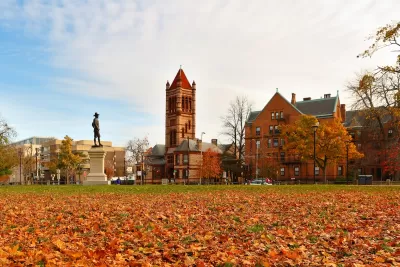Developers can now build housing of up to six stories in the Massachusetts city.

The Cambridge, Massachusetts city council voted 8-1 in favor of zoning reforms that could encourage more housing construction and higher density, lowering costs for residents.
According to an article by Mark Lannaman in Saporta Report, “Before last Monday’s changes, single-family zoning and other exclusionary zoning codes were in place throughout many parts of the historic city that has seen generations of students call home. Now, with the approved changes to the zoning code in Cambridge, up to four stories can be built anywhere in the city, and six stories on lots greater than 5,000 square feet.”
Prior to the changes, 85 percent of the city was made up of “nonconforming” buildings built prior to the current zoning code. “You couldn’t build anything in much of the city besides a large mansion, and I think there was a lot of distaste for the status quo,” said council member Burhan Azeem.
To allay fears of the city growing too quickly, the new regulations limit development to six stories citywide to encourage middle density that, ideally, will support a growing population at a reasonable pace of change. “The zoning changes are projected to add 1,195 new housing units by 2030, including 220 affordable units; that number rises to 3,590 new homes by 2040, including 660 affordable units, according to the Cambridge Development Department.”
The changes will also allow homeowners to divide larger homes, which was not allowed under prior rules.
FULL STORY: Zoning out: Cambridge, MA delivers huge win for urbanists and residents worried about housing

Florida Considers Legalizing ADUs
Current state law allows — but doesn’t require — cities to permit accessory dwelling units in single-family residential neighborhoods.

Manufactured Crisis: Losing the Nation’s Largest Source of Unsubsidized Affordable Housing
Manufactured housing communities have long been an affordable housing option for millions of people living in the U.S., but that affordability is disappearing rapidly. How did we get here?

Research Shows More Roads = More Driving
A national study shows, once again, that increasing road supply induces additional vehicle travel, particularly over the long run.

EV Chargers Now Outnumber Gas Pumps by Nearly 50% in California
Fast chargers still lag behind amidst rapid growth.

Affordable Housing Renovations Halt Mid-Air Amidst DOGE Clawbacks
HUD may rescind over a billion dollars earmarked for green building upgrades.

Has Anyone at USDOT Read Donald Shoup?
USDOT employees, who are required to go back to the office, will receive free parking at the agency’s D.C. offices — flying in the face of a growing research body that calls for pricing parking at its real value.
Urban Design for Planners 1: Software Tools
This six-course series explores essential urban design concepts using open source software and equips planners with the tools they need to participate fully in the urban design process.
Planning for Universal Design
Learn the tools for implementing Universal Design in planning regulations.
City of Moreno Valley
Institute for Housing and Urban Development Studies (IHS)
City of Grandview
Harvard GSD Executive Education
NYU Wagner Graduate School of Public Service
City of Cambridge, Maryland
Newport County Development Council: Connect Greater Newport




























